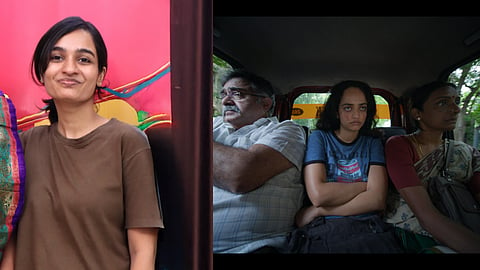

Filmmaker Varsha Bharath made waves even before her directorial debut, Bad Girl, hit the theatres. A good amount of that wave was torrential backlash, with critics, from what they could surmise of the film from the teaser, described Bad Girl as an outrageous celebration of teenage hedonism. Pick any interview of Varsha and you will know that she is a deeply opinionated individual. So, how did she resist the urge to respond to the controversies? “I was already on my way to Rotterdam (International Film Festival) when that happened, and I had an overwhelmingly positive response over there. It was a surreal experience. So, that helped me deal with the backlash,” she says.
However, Varsha admits that the initial reactions and conversations around the teaser were overwhelming. “I didn’t have anything to say because I thought the arguments that were made were neither fair nor justified. If there was an obvious misunderstanding, I would have stepped in to clarify. But it felt like people were just reading it (the teaser) in bad faith. It’s not like I expected everyone to welcome the film with open arms, but the degree to which certain people had issues with it was shocking,” she says, before weighing in on her learnings from the controversy.
And what could these learnings be? Apparently, the illusion of zeitgeist. “Every generation mostly socialises with people their own age. So, we believe the world has changed. I refuse to believe that a wide spectrum of feelings didn’t exist before us. I refuse to believe this generation invented the concept of teenage romance. Even parents were teenagers once, and they would have done the same things, just in a different way,” says Varsha, and points out that sections of the older audiences tend to look at coming-of-age romances as provocative due to their "instinctive protective nature”.
So, how do we begin to address this communication gap between generations? “Art is a good place to start. Randomly sitting down with your mother to talk about your coming-of-age experiences might be uncomfortable. That is where art comes into play. Even if you disagree with a film, they are good conversation starters,” says Varsha. Even while making an argument for films to be seen as a way for society to communicate with itself, Varsha also looks at their limitations, magnified by conventions and carefully nurtured perceptions. One of them is the curious case of flawed protagonists.
While most of the backlash against Bad Girl revolves around its portrayal of a flawed protagonist, with her ‘flaws’ displayed in all their vibrancy, Varsha notes how audiences are selective with their approval. ”There have been toxic characters who are glorified because there is a commercial angle, there is hero worship, and of course, badness sells,” says Varsha, adding, “But women don’t have the space to be flawed characters. Men have always had this freedom. Even big stars have had commercial successes playing straight-up evil men, but it’s not the case for women.”
Varsha is acutely aware of how this is a reflection of real-world constraints. “Women constantly have to be aware of what they do or say. Every woman carries a psychological filter within them, and they have to be conscious of it at all times. This isn’t the case for men. And the state of women characters in films is just a reflection of that,” says the filmmaker, who believes it is this realisation that allowed her to create her protagonist, Ramya. “My protagonist is quite flawed, and she has toxic traits like any other character. But, she is learning and growing.”
The problem with every flawed protagonist is when the flaws and toxic traits are glorified and mistaken for heroism. On whether she was conscious about the audience romanticising her “bad girl” protagonist, Varsha says she can't be skeptical about something that was never in the mainstream. “I call myself a progressive woman, but even I’ve felt excited watching films where the heroes are violent and aggressive. It has not left our DNA yet. People only romanticise what is already in the mainstream. What I’m doing with Bad Girl is subversion, and I don’t think people are going to get the idea that a flawed woman protagonist is something to be romanticised,” says Varsha.
For all the exhaustive cultural commentary that seems to make up the film’s inner layers, Varsha still likes to call Bad Girl a “fun, uplifting film.” As she looks forward to September 5 with excitement and a tinge of anxiety, Varsha lays out her hopes, not just for her debut, but also for our deeply film-loving society. “I’d feel gratified if a lot of women come to the theatres to watch Bad Girl. Whenever I go to the theatre, even a multiplex in a city like Chennai, it’s almost entirely a male crowd. And I understand why... But it's not just about women making films but also women watching films,” signs off Varsha with the hope of Bad Girl bringing this aspect to the mainstream.